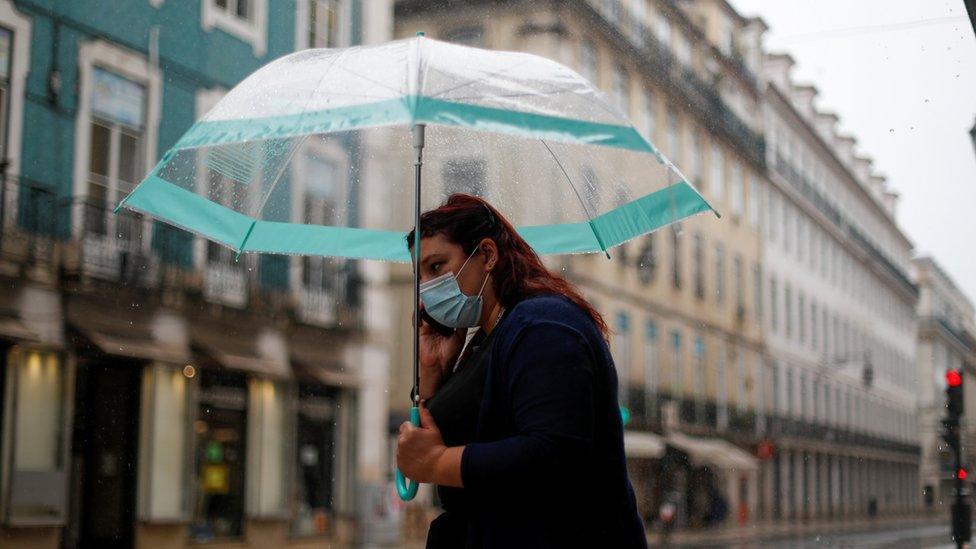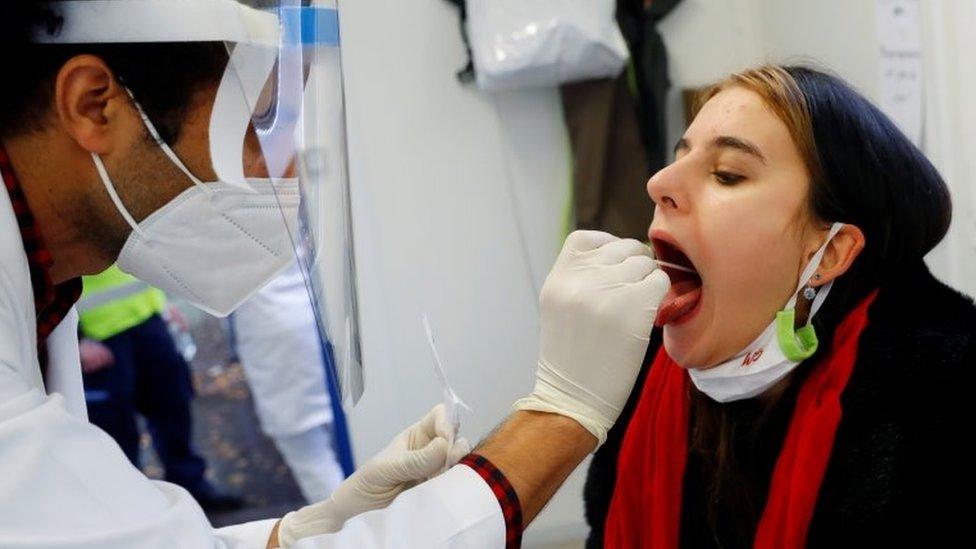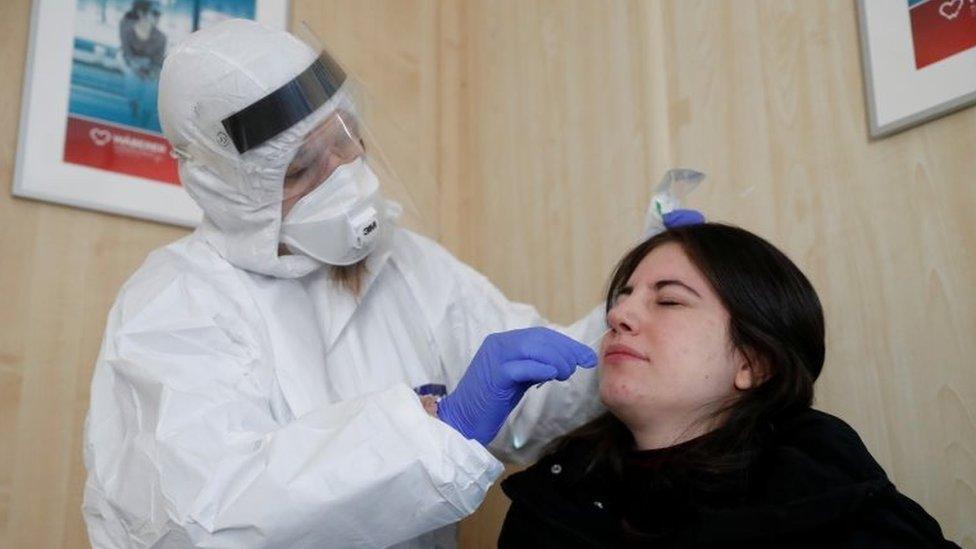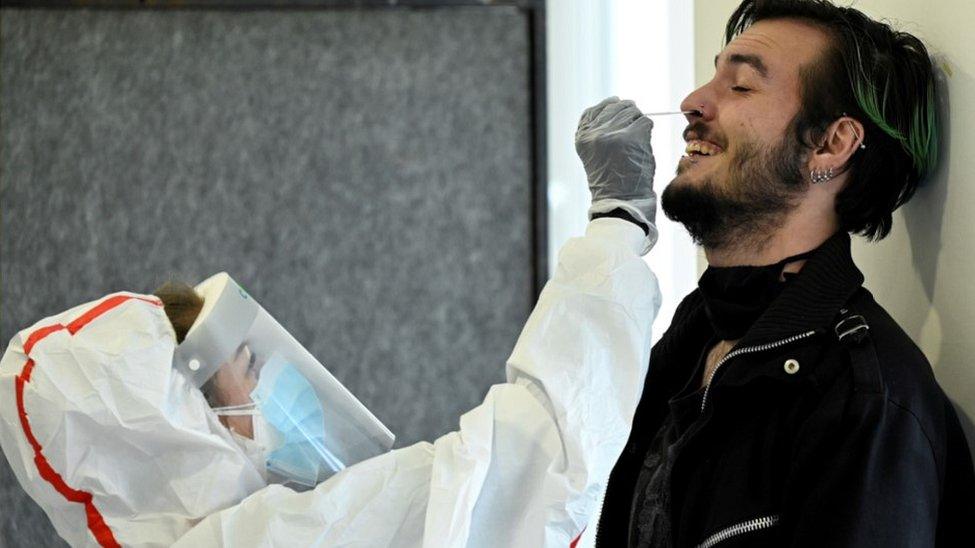Covid-19: Austria and Portugal announce restrictions
- Published

Portugal announced new restrictions on Saturday
Austria and Portugal have announced new restrictions in an attempt to curb the spread of coronavirus.
In Austria, the restrictions include a curfew from 20:00 to 06:00. Cafes and restaurants will be takeaway only.
Portugal's measures cover 70% of the country. People will be required to stay at home except for work, school or essential errands.
A number of European countries have enforced new measures as the continent grapples with a second wave.
France introduced measures on Friday and on Saturday, UK Prime Minister Boris Johnson announced a four-week lockdown for England.
On Friday, Austria recorded a record 5,627 infections, just short of the 6,000 level that the government claims will stretch hospitals beyond capacity. Figures were slightly lower on Saturday with 5,349 infections.

Austria's measures will last until the end of November
The restrictions, announced on Saturday, will come into effect on Tuesday and last until the end of November.
Gyms will shut along with museums however shops will remain open.
Kindergartens and primary schools will remain open, but high schools and universities will switch to online learning.
"We did not take this decision lightly but it is necessary," Chancellor Sebastian Kurz said during a news conference.
Portugal also announced new measures on Saturday, which will apply to 121 communes out of 308 in the country. The measures encompass both Lisbon and Porto.
People in those areas are being told to stay at home and work remotely where possible. Shops must close by 22:00.
Portuguese Prime Minister Antonio Costa said: "If nothing is done, the rise in infections will inevitably lead us to a situation of failure of our health system."
The measures will be reviewed in two weeks' time.
On Saturday, Portugal recorded 4,007 cases and 39 deaths. Almost 2,000 people are receiving treatment, of whom 286 are in intensive care.
What's happening elsewhere in Europe?
Much of Europe is battling with soaring infection rates, with several countries reinstating lockdowns or partial lockdowns to try to stem the wave.
Slovakia has announced it is testing everyone over the age of 10 to try and stop the spread of the disease there. The project to test four million people in the country, where infections have soared, is expected to last over two weekends.
Poland saw cases go up for a fifth day in a row, with Covid-19 patients occupying 16,144 hospital beds - 1,305 of them on ventilators - according to the Polish health ministry. There were 280 new deaths.
The rise comes as protesters against last week's near-total ban on abortion continue to defy government calls to stay at home due to rising infections.
The country already has the highest level of restrictions to date, with public gatherings banned, most schools closed and restaurants and cafes only offering take-away service.
Last week, Polish President Andrzej Duda, 48, tested positive for the virus, but experienced no symptoms.
As of Saturday, Poland had 340,834 total cases, with 5,351 deaths according to the European Centre for Disease Prevention and Control.
Deaths from Covid-19 in Hungary rose by 51, bringing the total to 1,750, the government said on Saturday.
It also said the number of Covid patients in hospital had exceeded 4,000 for the first time.

Hungary's prime minister has so far held back from imposing strict measures across the country
Hungary has yet to impose restrictions on mass events, with schools and shops remaining open and football matches operating throughout the pandemic.
However, Prime Minister Viktor Orban said in a radio interview on Friday that authorities would hand out fines to anyone failing to wear a mask where required.
As of Saturday, Hungary had 71,413 total cases, according to the European Centre for Disease Prevention and Control.
Greece has announced a partial lockdown, with restaurants and other leisure activities closed in major Greek cities from Tuesday. Greece has not seen as many cases as other parts of Europe, but there has been a steady increase since early October.
Belgium has announced a return to a national lockdown from Monday, as latest coronavirus figures show it has the highest infection rate in Europe. It means non-essential shops and businesses offering personal services like hair salons will be closed until mid-December. The country has more than half of its 2,000 intensive care unit beds already occupied by Covid-19 patients
- Published31 October 2020

- Published5 July 2022
